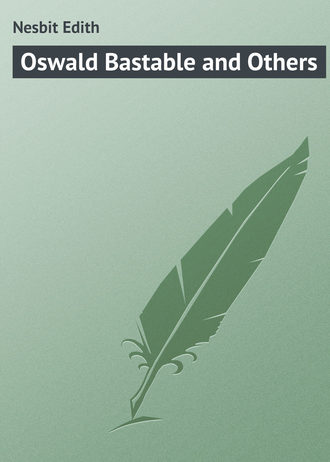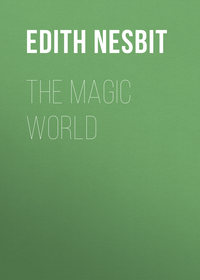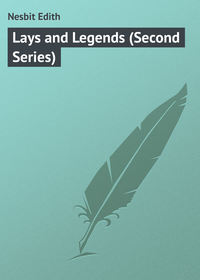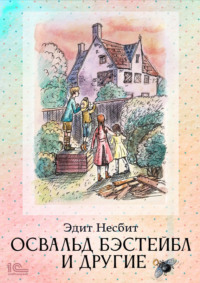 полная версия
полная версияOswald Bastable and Others
She could not believe that her Great-uncle Carruthers would have been so silly as to burn a will that he knew might be wanted at any moment. She used to stand in front of his portrait, and look at it; he did not look at all silly. And she used to look at the portrait of handsome, laughing Mr. Sheldon, who had been killed out hunting instead of marrying Aunt Maria, and more than once she said:
'You might tell me where it is; you look as if you knew.'
But he never altered his jolly smile.
Molly thought of missing wills from the moment her eyes opened in the morning to the time when they closed at night.
Then came the dreadful day when Uncle Toodlethwaite and Mr. Bates came down, and Uncle Toodlethwaite said:
'I'm afraid there's no help for it, Maria; you can delay the thing a bit, but you'll have to turn out in the end.'
It was on that night that the wonderful thing happened – the thing that Molly has never told to anyone except me, because she thought no one could believe it. She went to bed as usual and to sleep, and she woke suddenly, hearing someone call 'Molly, Molly!'
She sat up in bed; the room was full of moonlight. As usual her first waking thought was of the missing will. Had it been found? Was her aunt calling her to tell the good news? No, the room was quite still. She was alone.
The moonlight fell full on the old black and red and gold cabinet; that, she had often thought, was just the place where a will would be hidden. It might have a secret drawer, that the London detectives had missed. She had often looked over it carefully, but now she got out of bed and lighted her candle, and went over to the cabinet to have one more look. She opened all the drawers, pressed all the knobs in the carved brasswork. There was a little door in the middle; she knew that the little cupboard behind it was empty. It had red lacquered walls, and the back wall was looking-glass. She opened the little cupboard, held up her candle, and looked in. She expected to see her own face in the glass as usual, but she did not see it; instead there was a black space, the opening to something not quite black. She could see lights – candle-lights – and the space grew bigger, or she grew smaller, she never knew which. And next moment she was walking through the opening.
'Now I am going to see something really worth seeing,' said Molly.
She was not frightened – from first to last she was not at all frightened.
She walked straight through the back of the cabinet in the best bedroom upstairs into the library on the ground-floor. That sounds like nonsense, but Molly declares it was so.
There were candles on the table and papers, and there were people in the library; they did not see her.
There was great-uncle Carruthers and Aunt Maria, very pretty, with long curls and a striped gray silk dress, like in the picture in the drawing-room. There was handsome, jolly Mr. Sheldon in a brown coat. An old servant was just going out of the door.
'That's settled, then,' said Great-uncle Carruthers; 'now, my girl, bed.'
Aunt Maria – such a young, pretty Aunt Maria, Molly would never have known her but for the portrait – kissed her uncle, and then she took a Christmas rose out of her dress and put it in Mr. Sheldon's buttonhole, and put up her face to him and said, 'Good-night, James.' He kissed her; Molly heard the loud, jolly sound of the kiss, and Aunt Maria went away.
Then the old man said: 'You'll leave this at Bates' for me, Sheldon; you're safer than the post.'
Handsome Mr. Sheldon said he would. Then the lights went out, and Molly was in bed again.
Quite suddenly it was daylight. Jolly Mr. Sheldon, in his red coat, was standing by the cabinet. The little cupboard door was open.
'By George!' he said, 'it's ten days since I promised to take that will up to Bates, and I never gave it another thought. All your fault, Maria, my dear. You shouldn't take up all my thoughts; 'I'll take it to-morrow.'
Molly heard something click, and he went out of the room whistling.
Molly lay still. She felt there was more to come. And the next thing was that she was looking out of the window, and saw something carried across the lawn on a hurdle with two scarlet coats laid over it, and she knew it was handsome Mr. Sheldon, and that he would not carry the will to Bates to-morrow, or do anything else in this world ever any more.
When Molly woke in the morning she sprang out of bed and ran to the cabinet. There was nothing in the looking-glass cupboard.
All the same, she ran straight to her aunt's room. It was long before the hour when Clements soberly tapped, bringing hot water.
'Wake up, auntie!' she cried.
And auntie woke up, very cross indeed.
'Look here, auntie,' she said, 'I'm certain there's a secret place in that cabinet in my room, and the will's in it; I know it is.'
'You've been dreaming,' said Aunt Maria severely; 'go back to bed. You'll catch your death of cold paddling about barefoot like that.'
Molly had to go, but after breakfast she began again.
'But why do you think so?' asked Aunt Maria.
And Molly, who thought she knew that nobody would believe her story, could only say:
'I don't know, but I am quite sure.'
'Nonsense!' said Aunt Maria.
'Aunty,' Molly said, 'don't you think uncle might have given the will to Mr. Sheldon to take to Mr. Bates, and he may have put it in the secret place and forgotten?'
'What a head the child's got – full of fancies!' said Aunt Maria.
'If he slept in that room – did he ever sleep in that room?'
'Always, whenever he stayed here.'
'Was it long after the will-signing that poor Mr. Sheldon died?'
'Ten days,' said Aunt Maria shortly; 'run away and play. I've letters to write.'
But because it seemed good to leave no stone unturned, one of those letters was to a cabinet-maker in Rochester, and the groom took it in the dog-cart, and the cabinet-maker came back with him.
And there was a secret hiding-place behind the looking-glass in the little red lacquered cupboard in the old black and red and gold cabinet, and in that secret hiding-place was the missing will, and on it lay a brown flower that dropped to dust when it was moved.
'It's a Christmas rose,' said Molly.
'So, you see, really it was a very good thing the others pretended to have measles, because if they hadn't I shouldn't have come to you, and if I hadn't come I shouldn't have known there was a will missing, and if I hadn't known that I shouldn't have found it, should I, aunty, should I, uncle?' said Molly, wild with delight.
'No, dear,' said Aunt Maria, patting her hand.
'Little girls,' said Uncle Toodlethwaite, 'should be seen and not heard. But I admit that simulated measles may sometimes be a blessing in disguise.'
All the young Carruthers thought so when they got the five pounds that Aunt Maria sent them. Miss Simpshall got five pounds too because it was owing to her that Molly was taken to the White House that day. Molly got a little pearl necklace as well as five pounds.
'Mr. Sheldon gave it to me,' said Aunt Maria. 'I wouldn't give it to anyone but you.'
Molly hugged her in silent rapture.
That just shows how different our Aunt Marias would prove to be if they would only let us know them as they really are. It really is not wise to conceal everything from children.
You see, if Aunt Maria had not told Molly about Mr. Sheldon, she would never have thought about him enough to see his ghost. Now Molly is grown up she tells me it was only a dream. But even if it was it is just as wonderful, and served the purpose just as well.
Perhaps you would like to know what Aunt Maria said when the cabinet-maker opened the secret hiding-place and she saw the paper with the brown Christmas rose on it? Clements was there, as well as the cabinet-maker and Molly. She said right out before them all, 'Oh, James, my dear!' and she picked up the flower before she opened the will. And it fell into brown dust in her hand.
BILLY AND WILLIAM
A HISTORICAL TALE FOR THE YOUNG'Have you found your prize essay?'
'No; but I have found the bicycle of the butcher's boy.'
It is rather trying to have to walk three miles to the station, to say nothing of the three miles back, to meet a cousin you have never seen and never wish to see, especially if you have to leave a kite half made, and there is no proper lock to the shed you are making your kite in.
The road was flat and dusty, the sun felt much too warm on his back, the hill to the station was long and steep, and the train was nearly an hour late, because it was a train on the South-Eastern Railway. So William was exceedingly cross, and he would have been crosser still if he could have known that I should ever call him William, for though that happened to be his name, the one he 'answered to' (as the stolen-dog advertisements say) was 'Billy.' So perhaps it would be kind of me to speak of him as Billy, because it is rather horrid to do things you know people won't like, even if you think they'll never know you've done them.
Well, the train came in, and it was annoying to Billy, very, that four or five boys should bundle out of the train, and he should have to go up to them one after the other and say:
'I say, is your name Harold St. Leger?'
He did not particularly like the look of any of the boys, and of course it happened that the very last one he spoke to was Harold, and that he was also the one whom Billy liked least particularly of the whole lot.
'Oh, you are, are you?' was all he could find to say when Harold had blushingly owned to his name. Then in manly tones Billy gave the order about Harold's luggage and the carrier, said 'Come along!' and Harold came.
Harold was a fattish boy with whitey-brown hair, and he was as soft and white as a silkworm. Billy did not admire him. He himself was hard and brown, with thin arms and legs and joints like the lumps of clay on branches that the gardener has grafted. And Harold did not admire him.
There was little conversation on the way home; when you don't want to have a visitor and he doesn't want to be one, talking is not much fun. When they got home there was tea. Billy's mother talked politely to Harold, but that did not make anyone any happier. Then Billy took his cousin round and showed him the farm and the stock, and Harold was less interested than you would think a boy could be. At last, weary of trying to behave nicely, Billy said:
'I suppose there must be something you like, however much of a muff you are. Well, you can jolly well find it out for yourself. I'm going to finish my kite.'
The silkworm-soft face of Harold lighted up.
'Oh, I can make kites,' he said; 'I've invented a new kind. I'll help you if you'll let me.'
Harold, eager, quick fingered, skilful, in the shed among the string, and the glue, and the paper, and the bendable, breakable laths, was quite a different person from Harold, nervous and dull, among the farmyard beasts. Billy allowed him to help with the kite, and he began to respect his cousin a little more.
'Though it's rather like a girl, being so neat with your fingers,' he said disparagingly.
'I wish I'd got the proper sort of paper,' Harold said, 'then I'd make my new patent kite that I've invented; but it's a very extra sort of kind of paper. I got some once at a butter-shop in Bermondsey, but that was in a dream.'
Billy stared.
'You must be off your chump,' he said; and he felt more sorry than ever that his jolly country holiday was to be spoiled by a strange cousin, who ought, perhaps, to be in a lunatic asylum rather than at a respectable farm.
That night Billy was awakened from the dreamless sleep which blesses the sort of boy he was to find Harold excitedly thumping him on the back with a roll of stiff paper.
'Wake up,' he said – 'wake up! I will tell somebody that's awake. I dreamed that a jackdaw came in and flew off with that thin paper thing that was on the chest of drawers with the gilt button at the corner, and then I dreamed I got up and found this roll of paper up the chimney. And when I woke up I found it had and I had, and it's the real right kite-paper for my patent kite – just like I dreamed I bought in the butter-shop in Bermondsey. And it's five o'clock by the church clock, and it's quite light. I'm going to get up directly minute and make my patent kite.'
'Patent fiddlestick!' replied Billy, sleepy and indignant. 'You get along and leave me be; you've been dreaming, that's all. Just like a girl!'
'Yes,' repeated Harold gently, 'I have been dreaming; but when I woke up I found it had and I had; and here's the paper, and the flimsy thing with the gold stud's gone. You get up and see – '
Billy did. He got up with a bound, and he saw with an eye. And William turned on Harold and shook him till his teeth nearly rattled in his head and his pale eyes nearly dropped out. (I have called him William here because I really think he deserves it. It is a cowardly thing to shake a cousin, even if you do not happen to be pleased with him.)
'Wha – wha – what's the matter?' choked the wretched Harold.
'Why, you miserable little idiot, you've not been dreaming at all! You've been lying like a silly log, and letting that beastly bird carry off my prize essay! That's all! And it took me ten days to do, and I had to get almost all of it out of books, and the worse swat I ever did in my life. And now it's all no good. And there aren't any books down here to do it again out of. Oh, bother, bother, BOTHER!'
'I'm very sorry for you,' said Harold, 'but I didn't lie like logs – I did dream – and I've got the kite-paper, and I'll help you write the essay again if you like.'
'I shouldn't be surprised if it was all a make-up,' said William. (I must go on calling him William at present.) 'You've hidden the essay so as to be able to send it in yourself.'
'Oh, how can you?' said Harold; and he turned pale just like a girl, and just like a girl he began to cry.
'Now, look here,' the enraged William went on, 'I've got to be civil to you before people; but don't you dare to speak to me when we're alone. You're either a silly idiot or a sneaking hound, and either way I'm not going to have anything to do with you.'
I don't know how he could have done it, but William kept his word, and for three days he only spoke to Harold when other people were about. This was horrible for Harold; he had been used to being his father's pride and his mother's joy, and now he was Nobody's Anything, which is the saddest thing in the world to be. He tried to console himself by making kites all day long, but even kites cannot comfort you when nobody loves you, and when you feel that it really is not your fault at all.
William went about his own affairs; he was not at all happy. He finished his kite and flew it, and he lost it because the string caught on the church weather-cock, which cut it in two. And he tried to rewrite his prize essay, but he couldn't, because he had taken all the stuffing for it out of books and not out of his head, where it ought to have been.
Harold found some moments of forgetfulness when he was making the patent kite. It was very big, and the roll of paper he had found in his dream in the chimney was exactly the right thing for patent kite-making. But when it was done, what was the good? There was no one to see him fly it. He did fly it, and it was perfect. It was shaped like a bird, and it rose up, and up, and up, and hung poised above the church-tower, light and steady as a hawk poised above its prey. William wouldn't even come out to look at it, though Harold begged him to.
The next morning Harold dreamed that he had not been able to bear things any longer, and had run away, and when William woke up Harold was gone. Then William remembered how Harold had offered to help him with his kite, and would have helped him to rewrite the essay, and how through those three cruel days Harold had again and again tried to make friends, and how, after all, he was with his own people, and Harold was a stranger.
He said, 'Oh, bother, I wish I hadn't!' and he felt that he had been a beast. This is called Remorse. Then he said, 'I'll find him, and I'll be as decent to him as I can, poor chap! though he is silly.' This is called Repentance.
Then he found a letter on Harold's bed. It said (and it was blotted with tears, and it had a blob of glue on it):
'Dear Billy,
'It wasn't my fault about your essay, and I'm sorry, and am going to run away to India to find my people. I shall go disguised as a stowaway.
'Your affectionate cousin,'Harold Egbert Darwin St. Leger.'Billy did not have to show this letter to his mother, because she had gone away for the day, so he did not have to explain to her what a beast he had been. If he had had to do this, it would have been part of what is called Expiation.
Then he got the farm men to go out in every direction, furnished with a full description of Harold's silkworm-like appearance, and Billy borrowed a bicycle from a noble-hearted butcher's boy in the village and set out for Plymouth, because that seemed the likeliest place to look in for a cousin who was running away disguised as a stowaway. The wind blew straight towards the sea, and it occurred to Billy – he deserves to be called Billy now, I think – that the great patent kite, which was ten feet high, would drag him along like winking if he could only set it flying, and then tie it to the handle-bar of the bicycle. It was rather a ticklish business to get the kite up, but the butcher's boy helped – he had a noble heart – and at last it was done. Billy saw the great bird-kite flying off towards Plymouth. He hastily knotted the string to the bicycle handle, held the slack of it in his hand, mounted, started, paid out the slack of the string, and the next moment the string was tight, and the kite was pulling Billy and the bicycle along the Plymouth road at the rate of goodness-only-knows-how-improbably many miles an hour.
At last he came to the outskirts of Plymouth. I shall not tell you what Plymouth was like, because Billy did not notice or know at all what it was like, and there is no reason why you should. Plymouth seemed to Billy very much like other places. The only odd thing was that he could not stop his bicycle, though he pulled in the kite string as hard as he could. He flew through the town. All the traffic stopped to let him steer his mad-paced machine through the streets, and tradespeople, and people walking on business, and people walking for pleasure, all stopped with their respectable mouths wide open to stare at Billy on his bicycle. And the kite pulled the machine on and on without pause, and at a furious rate, and Billy, in despair, was just feeling in his pocket for his knife to cut the string, when some mighty sky-wind seemed to catch the kite, and it gave a leap and went twenty times as fast as it had gone before, and the bicycle had to go twenty times as fast too, and before Billy could say 'Jack Robinson,' or even 'J. R.,' for short, the kite rushed wildly out to sea, dragging the bicycle after it, right slap off the edge of England. So Billy and the butcher's boy's bicycle were dragged into the sea? Not at all. They were dragged on to the sea, which is not at all the same sort of thing. For the kite was such a very extra patent one, and so perfectly designed and made, that it was just strong enough to bear the weight of Billy and the bicycle, and to keep them out of the water. So that Billy found himself riding splendidly over the waves, and there was no more splashing than there would have been on the road on a very muddy day. Luckily, the sea was smooth, or I don't know what would have happened. It was smooth and greeny-blue, and the sun made diamond sparkles on it, and Billy felt as grand as grand to be riding over such a glorious floor. It was a fine time, but rather an anxious one too. Because, suppose the string had not held? No one could possibly ride a bicycle on the sea unless they had the really only truly right sort of kite to hold the machine up.
Away and away went the kite, through the blue air up above, and away and away went the bicycle over the greeny, foamy sea down below, and away and away went Billy, and the kite went faster and faster and faster, and faster went the bicycle – much, much faster than you would believe unless you had seen it as Billy did. And just at the front-door of the Bay of Biscay the bicycle caught up with a P. and O. steamer, and the kite followed the course of the ship, and went alongside of it, so you can guess how fast the bicycle was going.
And the Captain of the ship hailed Billy through a speaking-trumpet, and said:
'Ahoy, there!'
Billy replied:
'Ahoy yourself!'
But the Captain couldn't hear him. So the Captain said something that Billy couldn't hear either. But the people who were meant to hear heard, and the great ship stopped, and Billy rode close up to it, and they hauled him up by the string of the kite, and they put the bicycle in a safe place, and tied the string to the mast, and then the Captain said:
'I suppose I'm dreaming you, boy, because what you're doing is impossible.'
'I know it is,' said Billy; 'only I'm doing it – at least, I was till you stopped me.'
They were both wrong, because, of course, if it had been impossible, Billy could not have done it; but neither of them had a scientific mind, as you and I have, dear reader.
So the Captain asked Billy to dinner, which was very nice, only there was an uncertain feeling about it. And when Billy had had dinner, he said to the Captain:
'I must be going.'
'Is there nothing I can do for you?' said the Captain.
'I don't know,' said Billy, 'unless you happen to have a boy named Harold Egbert Darwin St. Leger on board. He said he was going away in a ship to India, disguised as a stowaway.'
The Captain at once ordered the ship to be searched for a boy of this name in this disguise. The crew looked in the hold, and in the galley, and in the foretop, and on the quarter, and in the gaff, and the jib, and the topsail, and the boom, but they could not find Harold. They ransacked the cross-trees, and the engine-room, and the bowsprit; they explored the backstays, the stays, and the waist, but they found no stowaway. They examined truck and block, they hunted through every porthole, they left not an inch of the ribs unexplored; but no Harold. He was not in any of the belaying-pins or dead-eyes, nor was he hidden in the capstan or the compass. At last, in despair, the Captain thought of looking in the cabins, and in one of them, hidden under the scattered pyjamas and embroidered socks of a Major of Artillery, they found Harold.
He and Billy explained everything to each other, and shook hands, and there was not a dry eye in the ship. (Did you ever see a dry eye? I think it would look rather nasty.)
Then said Billy to Harold:
'This is all very well, but how am I to get you home?'
'I can ride on the step of the bike,' said Harold.
'But the wind won't take us back,' said Billy; 'it's dead against us.'
'Excuse me,' said the Captain in a manly manner; 'you know that Britannia rules the waves and controls the elements. Allow me one moment.'
He sent for the boatswain and bade him whistle for a wind, expressly stating what kind of wind was needed.
And everyone saw with delight, but with little surprise, the kite deliberately turn round and retrace its steps towards the cliffs of Albion.
A cheer rose from passengers and crew alike as the bicycle was lowered to the waves, the string tightened, and the bicycle started, Billy in the saddle and Harold on the step. The event was a perfect windfall to the passengers. It gave them something to talk of all the way to Suez; some of them are talking about it still.
The kite went back even faster than it had come; it pulled the bicycle behind it as easily as a child pulls a cotton-reel along the floor by a bit of thread. So that Harold and Billy were home by tea-time, and it was the jolliest meal either of them had ever had.
They had determined to stop the bicycle by cutting the string, and then Harold would have lost the patent kite, which would have been a pity. But, most happily, the string of the kite caught in the vane on the top of the church tower, and the bicycle stopped by itself exactly opposite the butcher's boy to whom it belonged. He had a noble heart, and he was very glad to see his bicycle again.









